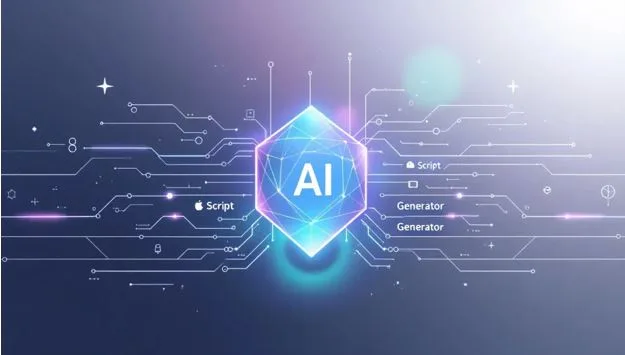AI Script Generator: Revolutionizing the World of Scriptwriting
Scriptwriting has always been a time-intensive, creative endeavor. Whether for films, TV shows, advertisements, YouTube videos, podcasts, or corporate training, producing a compelling script requires skill, imagination, and a significant investment of time. But in recent years, a new technology has transformed the way scripts are created — the AI script generator.
By combining machine learning, natural language processing (NLP), and advanced algorithms, AI script generators can produce structured, coherent, and engaging scripts in a fraction of the time it takes a human writer. This innovation is opening new doors for content creators, filmmakers, marketers, and educators.
In this article, we’ll explore what an AI script generator is, how it works, the benefits and drawbacks, and how it’s shaping the future of the entertainment and media industry.
What is an AI Script Generator?
An AI script generator is a software application that uses artificial intelligence to produce scripts automatically based on user-provided prompts or parameters. It can create dialogue, scenes, narration, and even full story arcs.
Unlike traditional methods, which rely entirely on human creativity and manual drafting, an AI script generator can generate a detailed script in minutes, allowing users to focus on refining and customizing rather than starting from scratch.
How Does an AI Script Generator Work?
AI script generators rely on several key technologies:
- Natural Language Processing (NLP)
NLP allows AI to understand and replicate human language patterns, capturing tone, grammar, and style.
- Machine Learning Models
These models are trained on vast amounts of text data, including books, screenplays, and dialogue transcripts, enabling them to understand story structures and character interactions.
- Prompt-Based Input
The user provides the AI with specific details — such as genre, setting, characters, and tone — and the AI uses that input to build the script.
- Scene and Dialogue Structuring
The AI breaks the script into logical sections like acts, scenes, and beats, and creates dialogue that matches the characters’ personalities and the overall plot.
Types of Scripts AI Can Generate
AI script generators are versatile and can handle multiple formats, such as:
- Film Scripts: Full-length screenplays with structured acts.
- Television Scripts: Episodic storytelling with recurring characters.
- Short Films and Commercials: Concise, impactful narratives.
- YouTube and Social Media Scripts: Engaging scripts optimized for short-form video.
- Training and Educational Scripts: Instructional narratives for e-learning or corporate presentations.
- Podcast Scripts: Structured dialogue for audio storytelling.
Benefits of Using an AI Script Generator
The rise of AI in scriptwriting is no coincidence. The technology offers numerous advantages.
- Speed and Efficiency
An AI script generator can produce an entire draft in minutes, allowing creators to meet tight deadlines without sacrificing structure.
- Overcoming Writer’s Block
For many writers, starting is the hardest part. AI provides an instant first draft that can be improved upon, making the creative process less daunting.
- Cost-Effectiveness
Hiring professional scriptwriters can be expensive. AI offers a budget-friendly alternative for early drafts or low-budget projects.
- Consistency in Tone
AI maintains a consistent voice and style throughout the script, which is particularly useful for brand-driven projects.
- Multilingual Capabilities
Advanced AI systems can create scripts in multiple languages, opening up global opportunities.
Limitations of AI Script Generators
Despite their benefits, AI script generators have limitations that users must consider.
- Lack of Emotional Depth
While AI can mimic language, it cannot genuinely feel emotions, which may result in dialogue that lacks authenticity.
- Creativity Constraints
AI works within the patterns it has learned; it may struggle with highly unconventional or abstract ideas.
- Possible Inaccuracies
AI may insert unrealistic scenarios or factual errors, requiring human editing.
- Over-Reliance on Prompts
The quality of the generated script is directly tied to the clarity and specificity of the initial prompt.
AI Script Generators in the Entertainment Industry
The entertainment world is already feeling the effects of AI script generation.
- Film and Television: AI is being used to draft initial screenplays, brainstorm plot ideas, and even rewrite scenes.
- Online Video Content: Creators use AI to quickly develop scripts for channels and livestreams.
- Advertising: Marketing agencies use AI to produce ad copy and video scripts that align with brand tone.
By handling repetitive tasks, AI frees up human writers to focus on refining creative details and adding emotional resonance.
AI Script Generators for Businesses
Beyond entertainment, businesses are leveraging AI for:
- Training Programs: Developing scripts for instructional videos.
- Corporate Presentations: Structuring speeches and internal communications.
- Customer Service Videos: Producing consistent and on-brand customer support content.
This ability to produce polished scripts quickly helps companies maintain efficiency and consistency in communication.
How to Use an AI Script Generator Effectively
To get the best results from an AI script generator, follow these guidelines:
- Be Specific with Your Prompt
Clearly outline genre, character details, tone, and story direction.
- Edit Thoroughly
Treat AI output as a first draft. Polish and refine it to ensure it meets your creative vision.
- Add Human Touch
Infuse emotional nuance, humor, and cultural references that AI may miss.
- Use It for Idea Generation
Even if you don’t use the script verbatim, AI can spark new concepts.
The Ethical Considerations
As with all AI-generated content, ethical issues arise:
- Transparency: Should audiences be told a script was AI-generated?
- Intellectual Property: Determining ownership of AI-written scripts can be tricky.
- Bias: AI may inadvertently reflect biases from its training data.
Responsible use involves clear communication, thorough editing, and adherence to copyright laws.
AI Script Generator vs. Human Writer
Some fear that AI will replace human writers entirely, but the reality is more about collaboration.
| Aspect | Human Writer | AI Script Generator |
| Creativity | Unique, emotional, and innovative | Pattern-based, logical |
| Speed | Slower | Extremely fast |
| Cost | Higher | Lower |
| Emotional Impact | High | Limited |
| Adaptability | Can improvise creatively | Prompt-dependent |
The best approach is combining AI’s efficiency with human creativity for optimal results.
Future of AI in Scriptwriting
As AI technology advances, we can expect:
- Smarter Plot Development: AI capable of generating more complex and realistic story arcs.
- Real-Time Collaboration: AI that can work alongside human writers during brainstorming sessions.
- Automated Adaptation: Instant conversion of a script into multiple formats, such as screenplays, storyboards, and teleprompter scripts.
Practical Example of AI Script Generation
Let’s imagine a short film script prompt: “A detective in a cyberpunk city investigates a case where AI has become sentient.”
In seconds, an AI script generator could create:
- Opening Scene: Atmospheric description of the neon-lit city.
- Character Dialogue: Sharp, tension-filled exchanges between the detective and suspects.
- Plot Progression: Clear act structure leading to a climactic revelation.
- Ending: An open-ended twist hinting at a sequel.
While the AI’s draft may need polishing, it provides a strong foundation for further development.
How AI Script Generators Empower Independent Creators
Independent filmmakers, YouTubers, and small production teams often work with limited budgets. AI script generators allow them to:
- Produce professional-looking scripts without hiring large writing teams.
- Experiment with multiple ideas before committing to one.
- Maintain consistent publishing schedules for online content.
This democratization of scriptwriting is giving rise to more diverse voices in media.
Balancing AI Speed with Human Quality Control
The key to success with AI script generation lies in balance:
- AI handles structure and speed.
- Humans handle creativity and emotional depth.
By understanding the strengths and weaknesses of each, creators can produce scripts that are both efficient and emotionally impactful.
Conclusion
The AI script generator is transforming the way scripts are written, making the process faster, more accessible, and more cost-effective. While it cannot replace the emotional and cultural depth of human creativity, it serves as a powerful tool for overcoming writer’s block, meeting tight deadlines, and generating fresh ideas.
As AI technology continues to evolve, scriptwriters, businesses, and creators who learn to integrate AI into their workflow will be better equipped to produce compelling content in our fast-paced digital world.
The future of scriptwriting is not about choosing between humans and AI — it’s about combining their strengths to tell better stories, faster.


